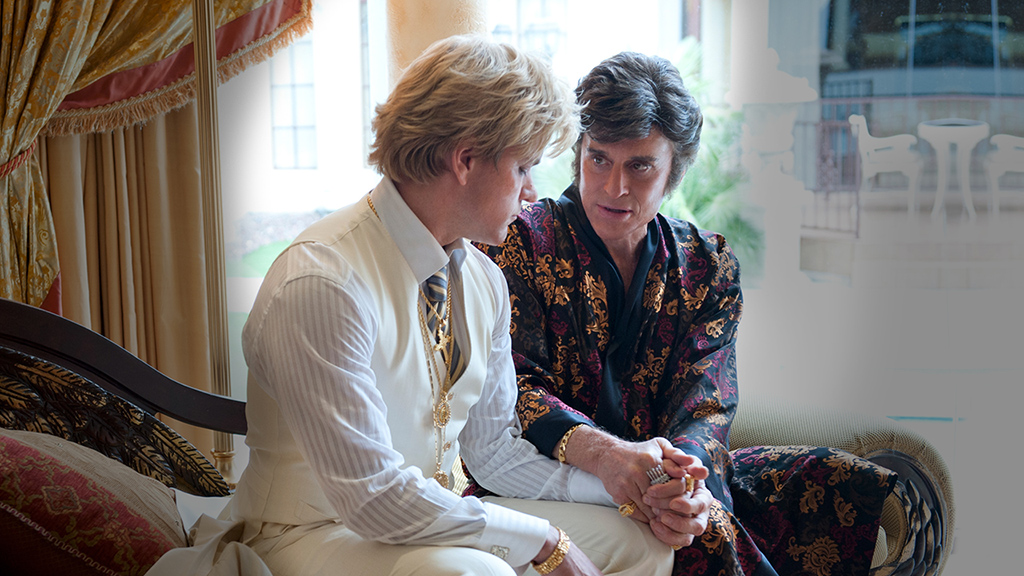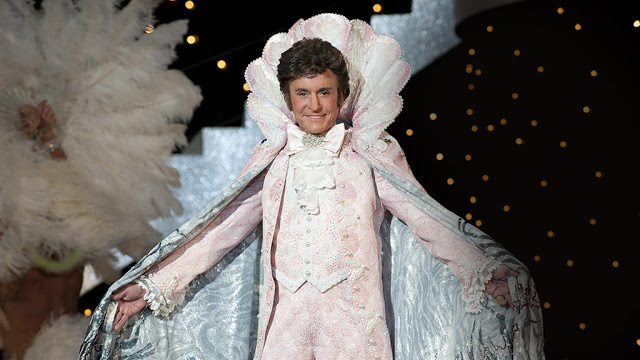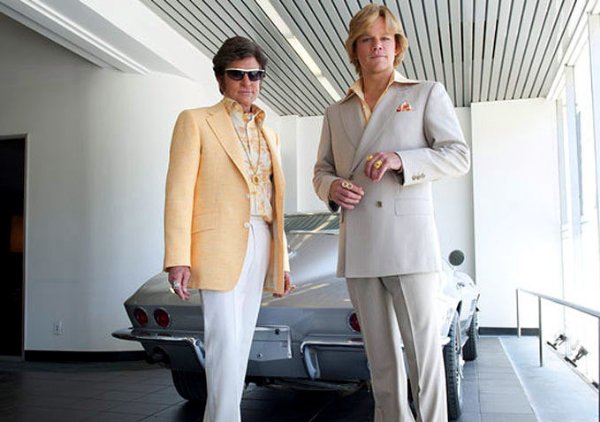|
In 1989
Steven Soderbergh made his
film debut with Sex, Lies and Videotape. The
film was daring, unnervingly original and made on a budget of just over
one
million dollars. Its domestic gross of nearly twenty-five million
dollars in
return heralded a new wave of independent films throughout the 1990s.
Twenty-four years later, Soderbergh will retire from filmmaking with Behind the Candelabra, a biopic of
pianist Liberace, which doesn't showcase his previous uniqueness
and
influence as an auteur filmmaker.
The film
is a love story, based on
Scott Thorson and Alex Thorleifson's book Behind
the Candelabra: My Life with Liberace. Yet it is also a
surprisingly
straightforward and conventional critique of fame and show business,
and like
we needed any reminding, how distasteful it is. On that level, it is a
disappointment. If nothing else however, the film is testimony to how
well
Soderbergh can still direct actors because in this relationship between
Liberace
and the much younger Scott Thorson, Michael Douglas and Matt Damon give
layered, complex and often funny performances, elevating the film above
its
conventional story framework. Their characterisation is also
complimented by a formal
sophistication that imposes thematic insight into their attraction and
inevitable
fallout.

The
project was originally meant to
be a HBO movie, until it was granted a cinema release. It traces how in
1977 Scott
Thorson (Damon), a trainee vet on a movie set, caught the eye of
pianist Liberace
(Douglas), who was playing onstage in swanky nightclubs. They moved in
together
to start a romantic but rather secretive relationship. Scott is allowed
to live
in luxury, away from his foster family, and is even employed to do
stage work
too. The relationship unwinds though when Scott finds himself
controlled by the
hilariously botoxed Dr. Jack Startz (Rob Lowe) and also when he becomes
increasingly insecure about Liberace's loyalty to him. Scott eventually
cracks
under a downward spiral of pills and drugs.
Michael
Douglas has throughout the
years played men who display great power, wealth and charisma in the
public
sphere. His work in The American
President and Wall Street are
among his most renowned feats. As Liberace his work is frank and
uncompromised,
like a weathered and ageing version of his classic performances. He is
note-perfect,
playing him as charismatic and flamboyant but also self-absorbed and
untrusting
of people who he thinks will steal his wealth. This is a reflection of
his
inner hubris as he believes that his talents are derived from a higher
order:
"God looks upon me with special favour," he says. High angle shots
peer down over the stage, asserting his belief in his appointment from
God, as
a single figure of attention in the black and gold clubs. Primary
colours,
including bright glittery red costumes, are judiciously selected,
juxtaposed
against the darkened theatres and used to imply Liberace's belief in
his own personal
distinction.

Matt
Damon characterises Scott as an
increasingly self-conscious and insecure young man, whose relationship
with Liberace
grows through two kinds of comfort: materialism and emotional
cushioning. Liberace's
mansion is an intimidating but irresistible prospect compared to the
drab and
shadowy form of Scott's adopted home. The mansion achieves its own
Biblical
connotations, stunningly realised through sparkling glassware and high
contrast
lighting. Liberace also manipulates Scott's loneliness, saying that he
could
adopt him. "Maybe I'm your real family," he teases. One of the few
dramatic peaks in Richard LaGravenese's script is when comfort reveals
itself
to be personal possession. Liberace seeks to preserve his legacy, not
simply by
adopting Scott, but by convincing him to undergo surgery so that the
two will
look more alike.
The
changing mood of the
relationship is echoed by Soderbergh's camera. Intercuts of Scott's
plastic
surgery operations are short but violent and shocking. When Scott
complains
about how suffocating their life is, the frame of the camera binds both
men
together and then a tracking shot follows them as they walk through the
halls
of the house to show the constraints of their relationship. Further,
rare exterior
shots, including brief cuts of the outdoors of a hospital or airport,
are grey
and empty to suggest the alienating outdoors of celebrity culture.

As rich
as the characters are, they
are ingrained in a linear, inorganic narrative that lacks exciting
detours.
Instead, Soderbergh and his screenwriter have used Liberace's affair to
retrace much
of the same material as the superior Magic
Mike, which itself echoed large portions of Paul Thomas Anderson's Boogie Nights. All three films are about
the way that young men are drawn into the gloss and the allure of show
business, only to find that it's an ugly world of competition, old
heads that
won't move on and drug abuse. These are Faustian stories and perhaps
personal
ones too. Retiring at fifty, Soderbergh is expressing his
dissatisfaction with Hollywood
and being famous. But it would be more fascinating to learn why an
older man,
who has overcome the difficult early period of show business with skill
and
experience, is now deterring himself from the industry.
|